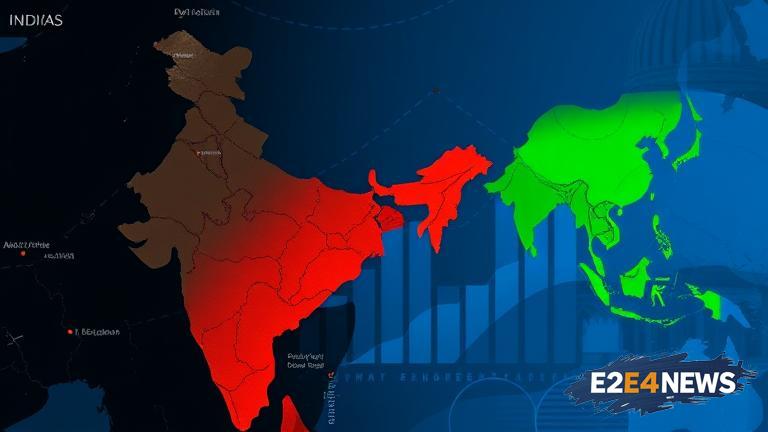India has been experiencing rapid economic growth in recent years, with its GDP increasing by over 7% annually. This growth has been driven by a combination of factors, including government reforms, investments in infrastructure, and a growing middle class. As a result, India has become an increasingly important player in global trade and politics. The country’s growing economy has also led to an increase in foreign investment, with many international companies setting up operations in India. Additionally, India’s large and growing population has made it an attractive market for businesses looking to expand their customer base. The Indian government has also been actively promoting the country’s economic growth through various initiatives, such as the ‘Make in India’ campaign. This campaign aims to encourage foreign companies to set up manufacturing operations in India, with the goal of creating jobs and stimulating economic growth. Furthermore, India’s economic growth has also had a significant impact on the environment, with the country becoming one of the world’s largest emitters of greenhouse gases. To address this issue, the Indian government has set a target of generating 40% of its electricity from non-fossil fuels by 2030. In terms of global politics, India’s growing economy has also given it more influence on the world stage. The country has been actively engaging with other nations, including the United States, China, and the European Union, to promote its economic and strategic interests. India has also been a key player in regional organizations, such as the Association of Southeast Asian Nations (ASEAN) and the South Asian Association for Regional Cooperation (SAARC). Moreover, India’s economic growth has also led to an increase in innovation and entrepreneurship, with many startups and small businesses emerging in the country. The Indian government has also been supporting these efforts through various initiatives, such as the ‘Startup India’ program. This program provides funding and other support to startups, with the goal of promoting innovation and job creation. Overall, India’s economic growth has significant implications for the country and the world. As the country continues to grow and develop, it is likely to play an increasingly important role in global trade and politics. With its large and growing population, India is also likely to become an increasingly important market for businesses looking to expand their customer base. However, the country must also address the environmental and social challenges associated with its economic growth, in order to ensure sustainable and equitable development. In conclusion, India’s economic growth is a complex and multifaceted issue, with significant implications for the country and the world. As the country continues to grow and develop, it is likely to play an increasingly important role in global trade and politics, and will require careful management to ensure sustainable and equitable development. The Indian government has been taking steps to promote economic growth, while also addressing the environmental and social challenges associated with it. The country’s growing economy has also led to an increase in foreign investment, with many international companies setting up operations in India. Additionally, India’s large and growing population has made it an attractive market for businesses looking to expand their customer base. The Indian government has also been actively promoting the country’s economic growth through various initiatives, such as the ‘Make in India’ campaign. This campaign aims to encourage foreign companies to set up manufacturing operations in India, with the goal of creating jobs and stimulating economic growth. Furthermore, India’s economic growth has also had a significant impact on the environment, with the country becoming one of the world’s largest emitters of greenhouse gases. To address this issue, the Indian government has set a target of generating 40% of its electricity from non-fossil fuels by 2030. In terms of global politics, India’s growing economy has also given it more influence on the world stage. The country has been actively engaging with other nations, including the United States, China, and the European Union, to promote its economic and strategic interests. India has also been a key player in regional organizations, such as the Association of Southeast Asian Nations (ASEAN) and the South Asian Association for Regional Cooperation (SAARC). Moreover, India’s economic growth has also led to an increase in innovation and entrepreneurship, with many startups and small businesses emerging in the country. The Indian government has also been supporting these efforts through various initiatives, such as the ‘Startup India’ program. This program provides funding and other support to startups, with the goal of promoting innovation and job creation. Overall, India’s economic growth has significant implications for the country and the world. As the country continues to grow and develop, it is likely to play an increasingly important role in global trade and politics. With its large and growing population, India is also likely to become an increasingly important market for businesses looking to expand their customer base. However, the country must also address the environmental and social challenges associated with its economic growth, in order to ensure sustainable and equitable development. In conclusion, India’s economic growth is a complex and multifaceted issue, with significant implications for the country and the world. As the country continues to grow and develop, it is likely to play an increasingly important role in global trade and politics, and will require careful management to ensure sustainable and equitable development.
